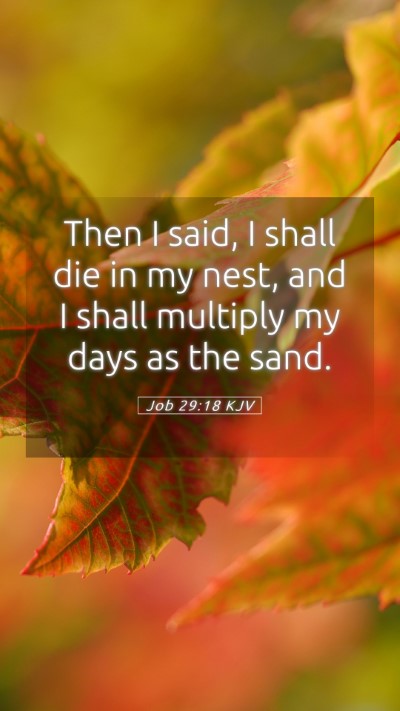Old Testament
Genesis Exodus Leviticus Numbers Deuteronomy Joshua Judges Ruth 1 Samuel 2 Samuel 1 Kings 2 Kings 1 Chronicles 2 Chronicles Ezra Nehemiah Esther Job Psalms Proverbs Ecclesiastes Song of Solomon Isaiah Jeremiah Lamentations Ezekiel Daniel Hosea Joel Amos Obadiah Jonah Micah Nahum Habakkuk Zephaniah Haggai Zechariah MalachiJob 29:18 Meaning
What is the meaning of Job 29:18?
Then I said, I shall die in my nest, and I shall multiply my days as the sand.
Job 29:18 Bible Verse Meaning
Meaning of Job 29:18 - Bible Verse Commentary
In this profound verse, Job expresses a deep meditation on his past, reflecting on confidence and hope regarding his future. Through a careful examination of this verse, we can extract significant insights into its meaning as captured by prominent public domain commentators.
Contextual Background
Job 29:18 states, "Then I said, I shall die in my nest, and I shall multiply my days as the sand." This remarkable declaration occurs during Job's monologue, where he reminisces about the prosperity he once enjoyed. This period marks Job's lamentation, contrasting his former glory against the backdrop of his present suffering.
Insights from Commentaries
Matthew Henry's Commentary
Matthew Henry highlights the metaphor of the "nest," symbolizing security and comfort. Here, Job yearns for the stability of his former life, free from affliction. Henry discusses the implication of longevity as expressed in Job's hope of living long enough to experience a joyful and prosperous life, akin to the richness of the sand which is plentiful and enduring.
Albert Barnes’ Notes on the Bible
Albert Barnes expands upon the notion of the "nest," suggesting it represents a place where Job would have felt safe and at ease. He explains that the phrase connotes not just the desire for a long life but also the longing for a life filled with purpose, companionship, and blessings, reminiscent of how birds nurture and protect their young in a nest. Barnes emphasizes that Job's assertion reflects a longing to return to a state of well-being.
Adam Clarke's Commentary
Adam Clarke acknowledges Job's aspirations regarding his days, interpreting them as a metaphor for hope and restoration. Clarke interprets the sand as the symbol of abundance and permanence in life. Moreover, he points out that Job’s saying indicates a remarkable faith in the continuity of life and joys that come with divine favor, despite the trials he currently faces. This highlights Job's resilience and continued yearning for peace amid his suffering.
Understanding Scripture: Themes and Applications
- The Nature of Hope: Job’s confidence in a future like that of the sand provides a glimpse into human resilience and optimism even during the harshest trials.
- Security in God: The imagery of the "nest" evokes thoughts on spiritual security offered by faith in God, urging believers to seek refuge in divine protection.
- Reflection on Suffering: Job’s reflections represent the universal human experience of grappling with suffering and yearning for restoration and better times.
- Application to Daily Life: This verse encourages believers to hold on to hope and trust in God's providence during periods of distress.
Related Bible Cross References
- Psalm 91:1 - "He who dwells in the secret place of the Most High shall abide under the shadow of the Almighty."
- Ecclesiastes 3:1 - "To everything there is a season, and a time for every matter under heaven."
- Isaiah 40:31 - "But those who wait on the Lord shall renew their strength; they shall mount up with wings like eagles..."
Conclusion
The exploration of Job 29:18 reveals rich layers of meaning pertinent to anyone seeking Bible verse meanings and Bible verse interpretations. It illustrates the interplay between past joys and present suffering while reflecting a deep-rooted hope for a brighter future. Through understanding this scripture, believers can gain insight into their spiritual journeys, reinforcing the importance of faith, hope, and divine support in times of trial.
Whether in online Bible study groups or via Bible study guides, the interpretations of this verse remind us that, despite life's transience, hope in God's plan remains a beacon for our hearts.


